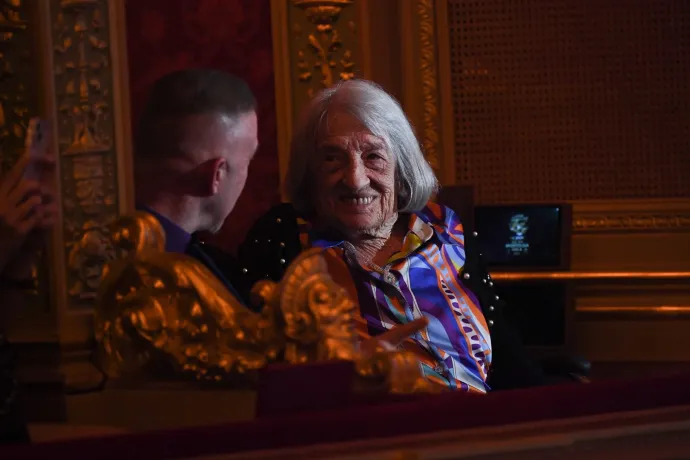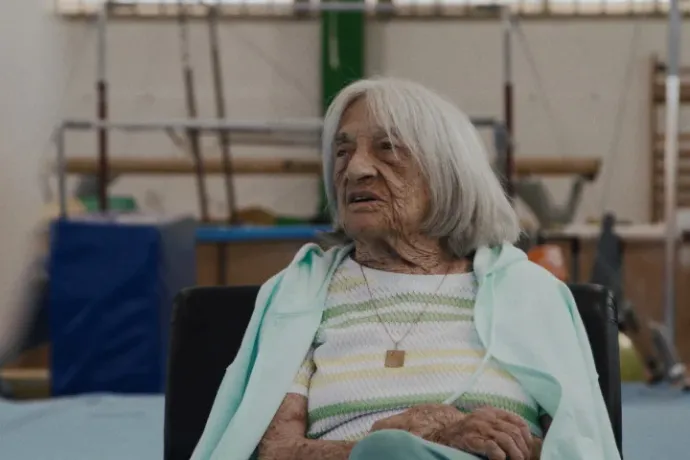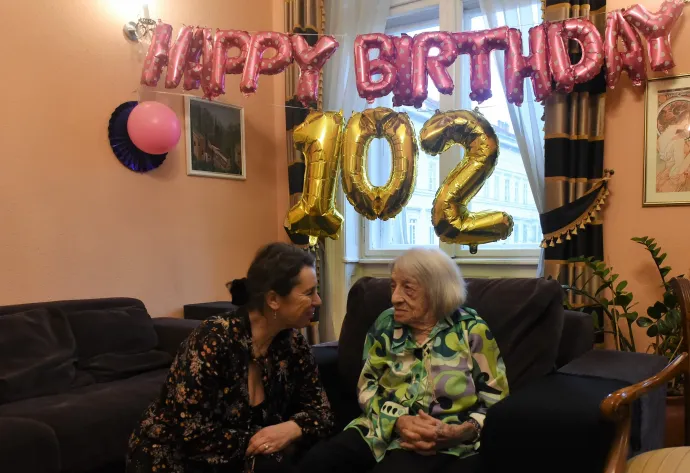The world's oldest living olympian, Ágnes Keleti turns 102, and celebrates with a documentary about her life

The Association of Hungarian Sports Journalists (MSÚSZ) held their annual gala on Monday, where the best sportsmen- and women, the best teams, and several other categories in Hungarian sport for 2022 were announced.
Those in attendance greeted the five-time Olympic champion, Ágnes Keleti, who has just turned 102 years old, with a standing ovation. The former gymnast is the oldest living olympic champion, and her life story has been an inspiration to many. Director Kata Oláh is one of them, and her documentary about Ms Keleti’s extraordinary life recently premiered in Hungary.
Speaking about the film, the director said that she hoped it would overcome the stereotype that a documentary can only be boring, since it's not just a lot of talking, but it tells a story. She entitled the film: "Conquering time" (Aki legyőzte az időt) – because Keleti is 102 years old, and if there's anyone who had to face serious adversity before reaching the top of the Olympic podium, it's her.
Keleti started devoting more time to gymnastics at the age of 16. Until then, she was more interested in playing the chello, but she was not able to pursue that after all. Nowadays, gymnasts retire at 16; the last Hungarian female champion, Henrietta Ónodi became olympic champion at the age of 15, and won the gold at the Olympics when she was 18, in 1992.

Keleti was born Klein in 1921, and was selected for the national team in 1938. However, because of being Jewish, she was quickly taken off the team, since the anti-Semitic laws in force in Hungary at the time also applied to sports: some of her “well-wishers” have notified those in charge that although she had attended a Christian high school, she was in fact Jewish. Two Olympic Games (1940 and 1944) were skipped because of the Second World War, but she was busy surviving anyways.
She purchased the documents of a Piroska Juhász and that became her alias. Although they cost her all she had, at least she survived and was even able to work as a furrier apprentice. She then became a maid in Szalkszentmárton and regularly walked 6 kilometers to the banks of the Danube, because there, she was able to practice elements of gymnastics without anybody noticing. She continued to dream of competing in the Olympics. In 1944, there was a time when she had reason to worry that some of those around her suspected her of being Jewish. But even if that was the case, nobody reported her, so she survived. Her father was less lucky, he perished in a concentration camp.
This part of the film has a rather dark mood, and according to recollections, Keleti's mood always turned sombre when the Holocaust was mentioned. When I visited her in Israel, she still got angry and clenched her fists at the mention of the tragedy of the Jews. She asked me how it could happen in the middle of Europe, centuries after the Middle Ages, that someone could be burned because of their ethnic origin.
Keleti was not under suspicion due to her false papers, but the image of a frozen mother in a nightgown, hugging her daughter on a Pest street has stayed with her to this day. She could neither forgive nor forget, no matter where she went in the world.
After 1945, she became an important member of the newly-formed national gymnastics team, and had she not been injured at the last training session, would have been a member of the 1948 team. Although she did travel to London for the Olympics, her ankle did not recover in time. Had she been healthy, the silver medal the team won could easily have turned into gold.
Then in 1952, at the age of 31, she won her first gold medal, so she was not disappointed, but there remained a thorn in her side as she only finished fourth on the beam. This made her even more determined and giving up did not even occur to her. Plus she was happy because she got to teach at the College of Physical Education. At the age of 35, she went to Melbourne for her second Olympics, where she became the first and to this day the only Hungarian to win 4 gold medals in one Olympics. Three of those were won within the space of a few hours.
The film doesn't dwell on these merits, but it does include an important and timeless adage from Keleti: "I wasn't interested in winning, I was interested in travelling. Maybe that's why I did so well." Nowadays, when there are whole teams of psychologists working alongside individual athletes to help them achieve success, this phrase brings back something of the golden age of sport.
Another interesting observation of hers is that it's no good competing when you're young because you don't have the right self-awareness. As time goes on, you have a different appreciation of yourself and what you have achieved. "The right mental attitude and love" this is how she summed up what it took to become a five-time olympic champion.
After the Olympics ended in December 1956, Keleti did not join the defecting Hungarian team on their American tour, but stayed in Melbourne, where her sister, eight years older than her was living. Their mother had left everything behind so that she could get a passport and the family could be together again. Ágnes, however, was not happy in Australia, she couldn't find her place with her qualifications.
She performed her gymnastics routines in fancy restaurants to make money. She used the money she had saved to buy a ticket back to Europe, where she met up with friends in Germany, and then, at the last minute, headed for Israel, where she finally settled and where love found her. She gave birth to two children after turning 40. One of her sons, featured in the film, says that when he was little he was ashamed that his mother was older, but now he sees her as a superhero who can still do gymnastics at 100.
Still, the focus of her life is not sporting success, but family and love, she states with her characteristic booming laugh. The crew also filmed in Israel, where her former assistant recalled how disciplined she was and how she taught them all discipline. "If you fall, you stand up," one of them remembers how she was taught a lesson while training with Keleti. She didn't like the word "teach"; she preferred to say that she is there to help young gymnasts.
“I'm thinking about the future, not the past.”
– she reacts in one of my favourite scenes, standing in front of her chest of drawers where her most important medals are displayed. She has been Athlete of the Nation in Hungary since 2003 and her dedication has also been recognised in Israel. The future lies in travel, she says in the film, and adds that she would like to go to Switzerland and Italy, among others.

If you watch the film without focusing exclusively on the main character, you will see unique images that you have never seen before. Such is, for example, the opening ceremony of Népstadion (today called Puskás Ferenc Aréna) in 1953 in colour, when Keleti carried the Olympic flag. Or the scene from 1952, when after the most successful Olympics of Hungarian sport, the returning olympians marched through the streets of Budapest lined with waving crowds – such an impact would be hard to match today.
"If you are modest, life loves you" – this sentence also reflects the personality and spirit of Keleti. Or "You get old, but that's okay, you just have to be prepared for it".
Another personal memory I have of her echoes this "no problem" attitude. She was being interviewed in Hungarian at the 50th anniversary of her greatest success, in Melbourne, in 2006. The interview had to be interrupted due to the arrival of an important guest. Then came a reception and an hour had passed before the reporter wanted to finish the interview, given that it is not the best to leave something half-finished. "It's fine with me," was the answer, as she laughed genuinely, because she truly didn't mind, even though most people would have been fuming by this time.
The film captures Keleti's love of life, her zest for life very well, and it's moving to see her dance to music beyond her 100th birthday. Her movements may not be as graceful as they were in the 50s, but they are still full of energy. For many years she divided her time between Hungary and Israel, but since the age of 95 Budapest is once again her only home. Here, she likes listening to a classical music performance with abandon, and also enjoys seeing young gymnasts on the beam or floor.
The film will be screened in select cinemas in Hungary from 13 January. The 3:30 pm screenings will have English subtitles.
For more quick, accurate and impartial news from and about Hungary, subscribe to the Telex English newsletter!